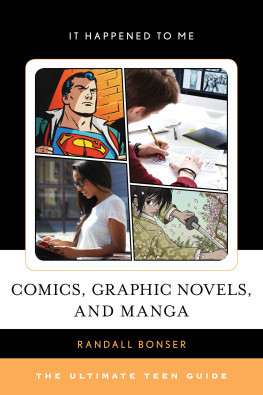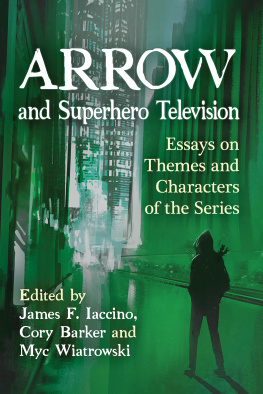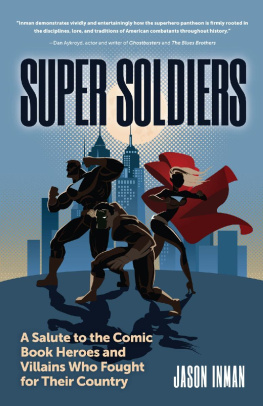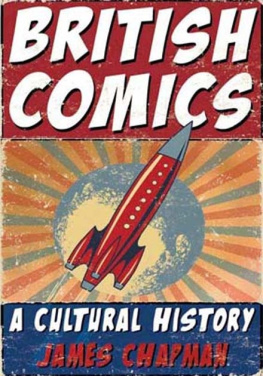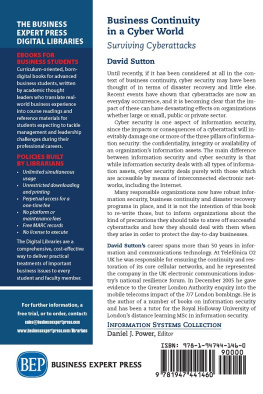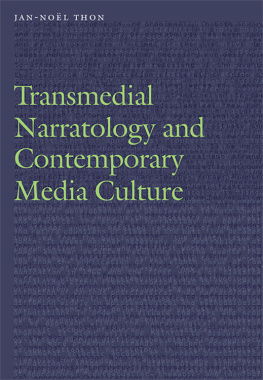www.upress.state.ms.us
The University Press of Mississippi is a member of the Association of American University Presses.
Copyright 2017 by University Press of Mississippi
All rights reserved
Manufactured in the United States of America
First printing 2017
Library of Congress Cataloging-in-Publication Data
Names: Friedenthal, Andrew J., author.
Title: Retcon game : retroactive continuity and the hyperlinking of America / Andrew J. Friedenthal.
Description: Jackson : University Press of Mississippi, 2017. | Includes bibliographical references and index.
Identifiers: LCCN 2016027224 (print) | LCCN 2016042246 (ebook) | ISBN 9781496811325 (cloth : alk. paper) | ISBN 9781496811332 (epub single) | ISBN 9781496811349 (epub institutional) | ISBN 9781496811356 (pdf single) | ISBN 9781496811363 (pdf institutional)
Subjects: LCSH: Narration (Rhetoric) | Mass media. | Storytelling in mass media. | Discourse analysis, Narrative. | HistoriographyPhilosophy.
Classification: LCC P96.N35 F75 2017 (print) | LCC P96.N35 (ebook) | DDC 302.23dc23
LC record available at https://lccn.loc.gov/2016027224
British Library Cataloging-in-Publication Data available
ACKNOWLEDGMENTS
In the years this book has taken to write, and in the years of academic training that led to this book, I have built up an enormous amount of intellectual and emotional debt. Though I know that a simple thank you will never pay back what I owe to the following people, I hope that this is a start.
First and foremost, I need to thank those members of the Department of American Studies at the University of Texas at Austin whose comments on this work strengthened me as a scholar and enlightened the project as a whole. Janet Daviss patience, insight, and good humor helped me to push beyond my own boundaries and follow the intellectual thread that engaged me and enlivened my argument. Similar thanks go to Brian Bremen, Michael Kackman, Randy Lewis, and Julia Mickenberg, who encouraged me to make my ideas both larger and more focused at the same time. My other cohorts and writing group colleagues in the department (particularly Tracy Wuster, whose one-sentence suggestion completely changed the direction of my research) are similarly owed a tremendous debt of gratitude.
The process of writing was made extremely easy thanks to the shepherding of my editor, Vijay Shah, who asked all the right questions to help me fine-tune my thinking about the larger ideas in this book. The same is true of the two anonymous reviewers, who provided excellent critiques that forced me to specify certain crucial definitions and more fully realize some of my examples. The review process can often be harrowing, but their feedback was entirely constructive and helpful, which I greatly appreciate. Lisa McMurtray and Kristi Ezernack, at the University Press of Mississippi, and Debbie Upton have also been crucial to negotiating the minefield of the final stages of producing a manuscript.
Parts of were previously published, in slightly different form, as Monitoring the Past: DC Comics Crisis on Infinite Earths and the Narrativization of Comic Book History, in the journal ImageTexT: Interdisciplinary Comics Studies (6, no. 2, Spring 2012).
Various other chapters in this book have been presentedin different formsas papers at several academic conferences, but the most important of these has been the Comic Arts Conference, run every summer as a part of San Diego Comic-Con International. I would like to thank Peter Coogan, Randy Duncan, and Kathleen McClancy, the CACs tireless organizers, for having me present at the conference multiple times, and thus allowing me to finally live out the fannish dream of being on a panel at Comic-Con. The Comics and Comic Art Area of the Pop Culture Association / American Culture Association, helmed by Terrence Wandtke, also provided me with the opportunity to speak on several panels and engage in vital conversations that allowed my thinking on this subject to develop and evolve. William Proctor, an expert in the narrative technique of the reboot, provided similarly important conversations via e-mail. Randy Scott and the rest of the staff at the Michigan State University Comic Art Collection, an invaluable archive for any researcher of mainstream American comics, were enormously helpful with the initial research for this project. Other intellectual help came from Jamie Tyler and Charles Hames, who helped me grapple with the difference between the New and Old Testaments; Alan Valdmets-Harris, who lent me material, and provided me with knowledge, about J. R. R. Tolkien; and my father, Martin Friedenthal, who helped me with important information relating to Sherlock Holmes and Sir Arthur Conan Doyle.
Without the people listed above I would never have been a strong enough scholar to finish this project; without the people that follow, I would never have been a strong enough person. The many friends and colleagues in the Departments of American Studies, English, and Radio, Television, and Film at the University of Texas commiserated with me on the many challenges of being in academia. The friends I have made in Austin, Texas, particularly the National Karaoke League and Random Geeky folksespecially the littlest one, who came this close to sharing a birthday with mehave reminded me of the importance of having fun and being a happy person, despite those challenges. My brothers, David and Brian, sister-in-law, Stephanie, and my extended family (especially Perin, Harriet, Jay, Gail, and Lena) have been unwavering in their vocal support and pride over the years, which has helped keep me going. Although I will keep her name private for professional reasons, my excellent therapist, who was recommended to me my first year of graduate school by a fellow student and whom I have recommended to other colleagues in turn, has literally kept me sane throughout this entire process. Lyla, Iko, and Binx provided much-needed snuggles at all hours of the day and night and frequently made my own whining seem minor in comparison to their always-urgent needs.
I owe my biggest debt of gratitude to the many excellent teachers I have had over the years. From high school teachers Mary Skinner and Bill Esner to college professors Annabelle Winograd, Dan Kotlowitz, and Kathleen Cunneen and graduate school professors Barbara Kirshenblatt-Gimblett and Janet Davis, my formal education has been filled with some of the wisest, kindest, and most caring people I will ever have the pleasure of meeting. Before encountering any of those people, though, I had the fortune to be taught about life, love, and humanity by several important figures: my grandparents Adelaide (whom I never knew, but who has informed my life down to my very name), Irving, Lou, and Vicky, all of whom I miss very much; my unofficial grandparents, Uncle Bernie and Aunt Marylin; and, most importantly, my parents, who may not have taught me everything I know, but who taught me everything


